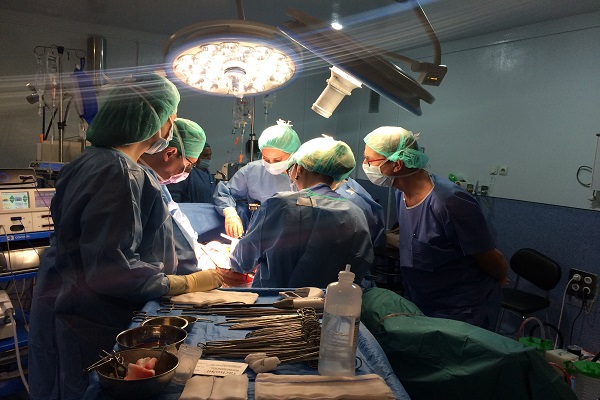Physician Katty Rosario Delgado Barriga, specialist in radiodiagnosis and member of the Multidisciplinary Unit of Abdominopelvic Oncological Surgery at the General University Hospital of Castelló, defended her PhD thesis in June at Universitat Jaume I
The study presented in June 2017 by Dr. Delgado constitutes the first scientific piece of work in which the usefulness of an optimized technique of Computed Tomography (CT) is evaluated, more specifically the evaluation of Enterography, for the presurgical evaluation of patients with advanced ovarian carcinoma.
The methodology used was the observational clinical study of an analytical type. Two radiological diagnostic tests, during a period of 42 months, in patients from the Multidisciplinary Unit of Abdominopelvic Oncological Surgery (MUAPOS) at the General University Hospital of Castellón were evaluated. The patients had been diagnosed with advanced ovarian cancer and treated by debulking surgery.
Once the statistical processing of all the data was completed, the results obtained in the last 3 and half years were presented after Dr. Katty Delgado’s evaluation.
PhD Doctors in Medicine Santiago F. Marco Doménech and Luis Llizán Tudela supervised this PhD thesis that analyses the natural history of ovarian cancer, the most lethal among pelvic cancers, and peritoneal carcinomatosis. The dissertation also evaluates the diagnostic utility of Computed Tomography (CT) Enterography versus the conventional one; and estimates and assesses the diagnostic performance of conventional CT and CT Enterography in the detection of peritoneal lesions caused by ovarian cancer.
It is worth to emphasize the support of the Head of the radiodiagnosis service at the General University Hospital of Castellón, Dr. José García Vila, and the directors of MUAPOS, Dr. Javier Escrig and Dr. Antoni Llueca, who contributed with their experience and knowledge in the development of this study.
The conclusions of the thesis, entitled “Usefulness of Computed Tomography Enterography (CTE) in the evaluation of advanced ovarian carcinoma”, will allow the establishment of some guidelines for the preoperative evaluation phase that will improve the detection of peritoneal lesions in patients with peritoneal carcinomatosis of an ovarian origin. This will surely lead to a better therapeutic approach and a better surgical planning.

